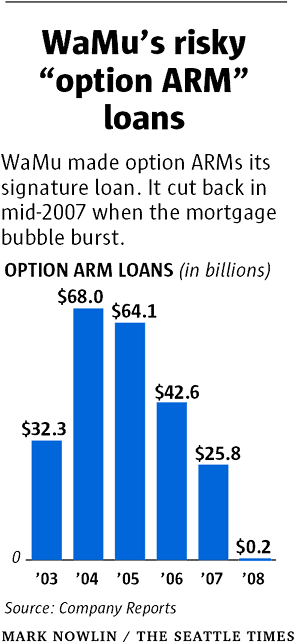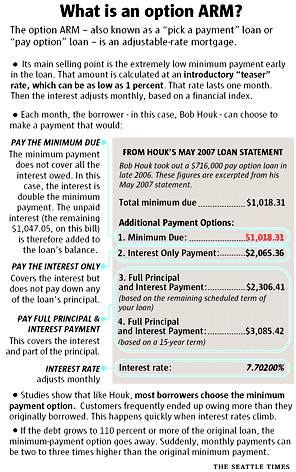Originally published October 26, 2009 at 12:02 AM | Page modified December 23, 2009 at 5:30 PM
![]() Comments (0)
Comments (0)
![]() E-mail article
E-mail article
![]() Print
Print
![]() Share
Share
Part two | WaMu: Hometown bank turned predatory
Through high-risk and overpriced loans, WaMu became one of the nation's biggest predatory lenders. The strategy eventually failed, bringing down the bank and costing thousands of borrowers their homes.
Seattle Times staff reporter
ERIKA SCHULTZ / THE SEATTLE TIMES
WaMu gave Barbara Simonson one of her loans after listing her monthly income on the application at nearly 10 times its actual level.
ERIKA SCHULTZ / THE SEATTLE TIMES
With his wife, Mary Kaye LaRussa, battling a brain tumor, Bob Houk jumped on the chance to save when he got a postcard promising a mortgage from WaMu starting at 1 percent interest. But it wasn't that simple, and he was soon paying 7.4 percent interest — far higher than the 4.6 percent he'd been paying on his previous mortgage.
About this report
WaMu set the stage for its own demise by embracing the riskiest loans and dismantling its safeguards. Read it here.
About the reporters
Drew DeSilver, Seattle Times business reporter, covers the economy and banking. David Heath, an investigative reporter, reported and wrote this story for The Times before leaving to work as a reporter at the nonprofit Huffington Post Investigative Fund.
Signs of predatory loans
Federal regulators define a predatory loan as one that imposes unfair and abusive loan terms on a borrower. Characteristics can include:•Making unaffordable loans based on the assets of the borrower rather than on the borrower's ability to repay an obligation.
•Charging excessive interest rates that may involve steering a borrower to a higher-cost loan.
•Inducing a borrower to refinance a loan repeatedly in order to charge high points and fees each time the loan is refinanced ("loan flipping").
•Engaging in deception to conceal the true nature of the loan obligation from an unsuspecting or unsophisticated borrower.
Source: Federal Deposit Insurance Corporation
![]()
Second of two parts
For decades, Washington Mutual lived up to its image as a staid, straight-laced Seattle institution. Its motto: "The Friend of the Family."
By the time WaMu made history last year as the nation's biggest bank failure, it bore no resemblance to this homey image.
What few people knew was that bank executives crafted a radical new business strategy in 2003 that was intended to boost profits. The new WaMu used huge sales commissions and misleading marketing to hawk risky and overpriced loans to borrowers.
In short, WaMu became one of the nation's biggest predatory lenders.
The strategy eventually failed, not only bringing down Washington Mutual but deceiving borrowers, costing thousands their homes.
In particular, the bank promoted as its "signature loan" a complex product known as the option ARM. This adjustable-rate mortgage, much like a credit card, gave borrowers the choice of making low minimum payments. But that option didn't cover the interest and only dug them deeper into debt.
WaMu and its brokers promoted this feature as a benefit for borrowers. Pay less on your mortgage and take that vacation you've always dreamed of.
WaMu lured borrowers with a very low interest rate of about 1 percent. But this "teaser" rate was good only for one month. After that, the option ARM could have far higher interest rates than conventional 30-year fixed-rate loans.
With each minimum payment, unpaid interest piled up. Once the debt grew too large, WaMu canceled the minimum-payment option. You could suddenly get a new bill for two or three times what you had been paying.
Another aspect of the option ARM made it even riskier. Washington Mutual broke the most basic rule of lending, a rule as fundamental as "all lifeguards must be able to swim":
It would give you an option ARM even if you couldn't afford to repay it. You only needed enough income to cover the minimum payments.
Regulators did nothing about it until years later.
Several other top lenders pushed the option ARM, as well, contributing to the mortgage crisis. The White House is pushing for a new consumer regulatory agency to end these sorts of abuses, but the banking lobby and even federal banking regulators are opposed. Banks say more regulation would kill innovation.
"I hated that loan," said Mary Kay Morse, a 20-year veteran at WaMu whose job was to persuade independent brokers to make option ARM loans. "It's just not a good loan. It wasn't good for the borrower."
That loan affected her opinion of WaMu.
"I always felt like I worked for a really honest industry that cared for the borrowers they dealt with," she said. The corporate culture changed to: "We just want to do the most we can to make money for the bank."
WaMu's new strategy
The strategy that eventually would destroy Washington Mutual and devastate so many of its borrowers was first presented publicly in a 487-seat auditorium in Manhattan's theater district on Dec. 9, 2003.
Chief Executive Officer Kerry Killinger stood before an audience of Wall Street professionals on "Investors Day" and spoke of the need for bold change.
"The environment that we are in today is more challenging than I have seen in several quarters," Killinger said, "and that's been particularly paramount in the mortgage space."
Common wisdom holds that the mortgage meltdown began in 2007. But in fact, serious trouble was brewing in 2003.
The Federal Reserve, led by Alan Greenspan, had aggressively cut interest rates starting in 2001 to calm the economic tremors of the dot-com bust and the Sept. 11 terrorist attacks.
Rates on 30-year loans, which had hovered around 7.5 percent, tumbled to 5.25 percent by June 2003. Americans pounced on the falling rates to buy new homes or refinance costlier loans. The massive surge in lending stoked Washington Mutual's profits.
July was a turning point. Rates began creeping up, sending borrowers scurrying to lock in before rates went higher. The mortgage market was peaking.
As demand waned, lenders tried to entice business by slashing profit margins on conventional mortgages, such as the 30-year fixed. WaMu's chief business was making home loans, yet it lost money on that segment in the third quarter of 2003.
By November, WaMu had eliminated 4,500 full-time jobs in home lending and ousted the division head. By year's end, its mortgage business had shrunk with alarming speed, down by about half from the summer.
After Killinger finished speaking, Chief Financial Officer Tom Casey got up and presented WaMu's solution.
WaMu had other types of loans, such as subprime and home-equity lines of credit, that remained highly profitable. He noted there was even a specialty loan for borrowers with good credit that remained lucrative, the option ARM.
As Casey explained it, the bank recently had beefed up its commissions and retrained its sales force to push option ARMs. In just the past few months, they had climbed from 15 to 35 percent of its mortgage business.
The loan — mind-numbingly complex and highly risky for both the bank and its customers — originally was created for the savviest and most risk-tolerant of borrowers.
When Casey took questions, none of these highly paid professionals asked an important question: Why would the average customer want a loan so risky, costly and hard to understand?
"I felt totally duped"
Usually, Bob Houk's wife handled the family's money matters. But after being diagnosed with a brain tumor, she was in and out of the hospital, so he took over. In late 2006, he received a postcard with WaMu's logo on it.
Houk already had a 30-year WaMu mortgage at a fixed rate of 4.6 percent. But the postcard promised to lower the monthly payments on their Bainbridge Island home with an adjustable-rate mortgage starting at only 1 percent interest.
He liked the idea of cutting expenses. A son was in college, his wife was on disability from her job as a nurse, and Houk, a physician assistant at Group Health, worked only part time to be at her side.
Houk called the number on the card, reached an independent mortgage broker in California, and made all the arrangements over the phone. Soon someone came to his house with papers to sign. Houk was impressed at how easy the process was.
But a couple of months later, Houk noticed something on his monthly statement that gave him a sick feeling. Instead of one low monthly payment, there were now options. His minimum monthly payment of only $1,018 was there. But there were also higher-priced options for paying interest only or for paying interest and principal. Just covering the interest that month would cost him about $1,000 more.
The 1 percent interest rate Houk thought he was getting was only good for the first month. It had reset to 7.4 percent, nearly 3 percentage points above his previous WaMu loan. This was buried in the fine print in a sheaf of legal documents he had signed.
"Who in their right mind would give up a 4.6 percent loan?" Houk said. "I felt totally duped."
Houk said he called Washington Mutual, but the woman he talked to said nothing could be done. WaMu just gets the loan from the broker, he recalled her saying, so the bank's not responsible.
To drum up customers for these overpriced loans, WaMu offered hefty commissions to its sales force.
Loan officers working inside WaMu were rewarded with higher commissions for signing up a borrower for an option ARM rather than a conventional loan.
But WaMu made the vast majority of its option ARMs through its network of independent mortgage brokers. They worked in a loosely regulated industry. In many states, the job required no education, no background check and no oversight. While there are reputable brokers, the industry suddenly attracted a motley crew, who could make six figures in a year in commissions.
WaMu did not reward brokers for getting its customers the best deal. Just the opposite. The worse the terms were for borrowers, the more WaMu paid the brokers.
A WaMu daily rate sheet obtained by The Seattle Times shows how lavish the rewards could be. On an option ARM, WaMu would reward brokers as much as 3 percent of the loan amount — more than triple the standard commission at the time.
Brokers would get an additional point — 1 percent of the loan — for roughly every half-point in higher interest the borrower paid. So the broker would get 3 percent of the loan if he could get the borrower to pay 1.5 percent above the market rate.
WaMu could afford to pay such high commissions, called "yield spread premiums," because the money actually came from the borrower in the form of higher interest rates and prepayment penalties.
Houk's broker, for example, got paid a commission of $9,498 on a $316,000 loan, according to loan documents. Houk didn't know he was paying a huge commission. The broker also charged him a $795 origination fee.
Houk was in the dark because federal disclosure requirements for these loans are lax. In fact, of the nearly two dozen WaMu customers with option ARMs interviewed by The Times, none knew about the yield spread premium or that brokers were rewarded for locking them into loans that were costlier than they needed to be.
Fooled by the loan
Even business-savvy borrowers could get fooled by the option ARM. As an owner of an advertising business in North Miami Beach, Fla., John Terboss wanted to keep his costs down. So he took out a WaMu option ARM and paid $2,000 a month.
Terboss grew tired of his principal going up, but he couldn't afford the loan's interest-only payment of $4,100. Responding to a flier in the mail, Terboss called a broker who promised a new $720,000 option ARM from WaMu with an interest-only payment of $3,200 a month. Terboss kept the letter from the broker making this promise.
But what was promised was impossible. Terboss already had a WaMu option ARM loan. Paying the loan off and getting a new one put Terboss right back where he started. The only ones to benefit from a refinance were the broker and the bank.
Only later, when told by The Seattle Times, did Terboss learn the broker was paid an $18,000 commission on the loan.
When the monthly bill came, Terboss was stunned to discover it was $4,700 — $1,500 more than promised.
Terboss called the broker and was told there must have been a misunderstanding about how WaMu calculated its payments. Terboss called WaMu but said the bank refused to talk to him.
"Who in their right mind would refinance with the same bank to pay [$1,500] a month more?" Terboss asked.
Finally, the broker offered to refinance Terboss' loan again into a loan from a different lender. But there was a problem. WaMu charged stiff prepayment penalties for up to three years on its option ARMs. The penalties helped cover the yield spread premiums and discouraged shellshocked borrowers from finding better deals.
Terboss decided he had no choice. Within five months, he paid the $21,000 prepayment penalty and refinanced to a Citibank loan.
"We're not naive to business," Terboss said. "This is heartbreaking that we got caught like this."
Borrowers didn't know when they were getting cheated because the loan was so difficult to understand, said Renee Larsen, a former WaMu loan officer in Florida. She blames WaMu for putting trusting borrowers in such a bind.
Disturbed by getting so many complaints from option ARM customers, she contacted the Florida Attorney General's Office and turned in her own bank.
"I feel like they perpetuated fraud with my help," Larsen said. "It makes me very angry."
"Reckless and immoral"
In late 2005, federal banking regulators tried to rein in option ARM abuses. They proposed better disclosure to borrowers and later asked WaMu and others to stop lending to people who couldn't afford to repay. Industry lobbyists resisted the proposals. The regulators issued an "industry guidance" that asked banks to make better efforts to treat borrowers fairly.
Fay Chapman, WaMu's general counsel, recalled dissension about the option ARM at the executive level, but "the majority thought they were a great product and the majority won."
Chapman thinks the option ARM was a good product for the right borrower. But as the loan became so profitable, she said, "Mortgage brokers put people into the product who shouldn't have been."
Seattle mortgage broker Kathryn Keller said it was WaMu's decision to try to put everybody into a specialty loan designed for savvy speculators. "I think that was reckless and immoral," Keller said.
The option ARM was such a bad deal for borrowers, says Chuck Cross, a former Washington state regulator who led investigations of predatory lending by Household Finance and Ameriquest, that the obvious question is: Why would anyone who understood it want one?
"The only way they [option ARMs] could be sold was not to give the borrowers all the information," Cross said.
Washington Mutual was not alone in mass marketing the option ARM and paying huge premiums to brokers for costlier loans. Lending giant Countrywide, Golden West Financial and others aggressively pushed them.
Last year, Countrywide agreed to pay $8.7 billion to resolve charges brought by several states' attorneys general, including Washington's, in part for engaging in predatory lending with its option ARM. The lawsuit accused Countrywide of giving option ARMs to borrowers who couldn't understand them or repay them.
Bad loans on the books
The industry's defense for the option ARM, even today, is that since home prices were rising so quickly then, borrowers could go deeper into debt and still come out ahead.
Of course, if housing prices actually fell, the results would be disastrous. You couldn't refinance your loan. You'd lose money selling your house. And if all you could afford was the option ARM's minimum monthly payment, you faced certain foreclosure when the loan reset.
It was for these reasons that Wells Fargo said it refused to make option ARMs.
Several former WaMu executives interviewed by The Times said no one could have foreseen the housing bubble at the time. But someone at WaMu did: Killinger, the CEO.
In June 2005, he told Wall Street professionals of a new challenge facing WaMu's mortgage business: "We have a significantly above-average risk in housing today. ... Overall, the price appreciation has been at a very high level and, I believe, an unsustainable level."
Translation: Home prices can't keep going up.
The prospect of a housing recession made the option ARM too risky for WaMu to keep on its own books because borrowers might default in large numbers. But, as Killinger explained, there was a solution: WaMu would continue to make the loans, but would bundle them into mortgage-backed securities and sell them to big investors. Soon, Washington Mutual was selling nearly all of its new option ARMs.
But by July 2007, across the industry, big investors became alarmed by how many borrowers were not paying off their loans, and stopped buying packages of option ARMs. Seemingly overnight, Washington Mutual got stuck with billions in risky loans it had intended to sell.
The number of bad loans on WaMu's books soared, scaring big depositors whose accounts weren't fully insured.
When WaMu went under, the bad option ARM loans in its portfolio had nearly quintupled in the last 12 months to $3.2 billion.
When a run on the bank ignited in September last year, regulators shut down WaMu and sold its assets to JP Morgan Chase.
Killinger declined to respond to specific questions from The Seattle Times, but he said that his strategy in 2003 was meant to protect the bank from a looming housing bubble.
A struggle for reform
Today, the biggest option ARM players — Washington Mutual, Countrywide, IndyMac and Wachovia — are out of business or have been sold. The loan isn't used, but is still not against the rules.
Banks paying mortgage brokers more for putting borrowers into higher-rate loans continues to be the standard practice today. The Federal Reserve Board has proposed rules that could curb this practice. The Fed has also proposed rules for improving disclosure to borrowers on option ARM loans.
Meanwhile, the FBI is investigating whether Washington Mutual executives broke criminal laws by deceiving shareholders about the bank's health. As for now, there is no known federal investigation under way for deceiving borrowers.
UPDATE - 09:46 AM
Exxon Mobil wins ruling in Alaska oil spill case
UPDATE - 09:32 AM
Bank stocks push indexes higher; oil prices dip
UPDATE - 08:04 AM
Ford CEO Mulally gets $56.5M in stock award
UPDATE - 07:54 AM
Underwater mortgages rise as home prices fall
NEW - 09:43 AM
Warner Bros. to offer movie rentals on Facebook
More Business & Technology headlines...

Entertainment | Top Video | World | Offbeat Video | Sci-Tech
general classifieds
Garage & estate salesFurniture & home furnishings
Electronics
just listed
More listings
POST A FREE LISTING








